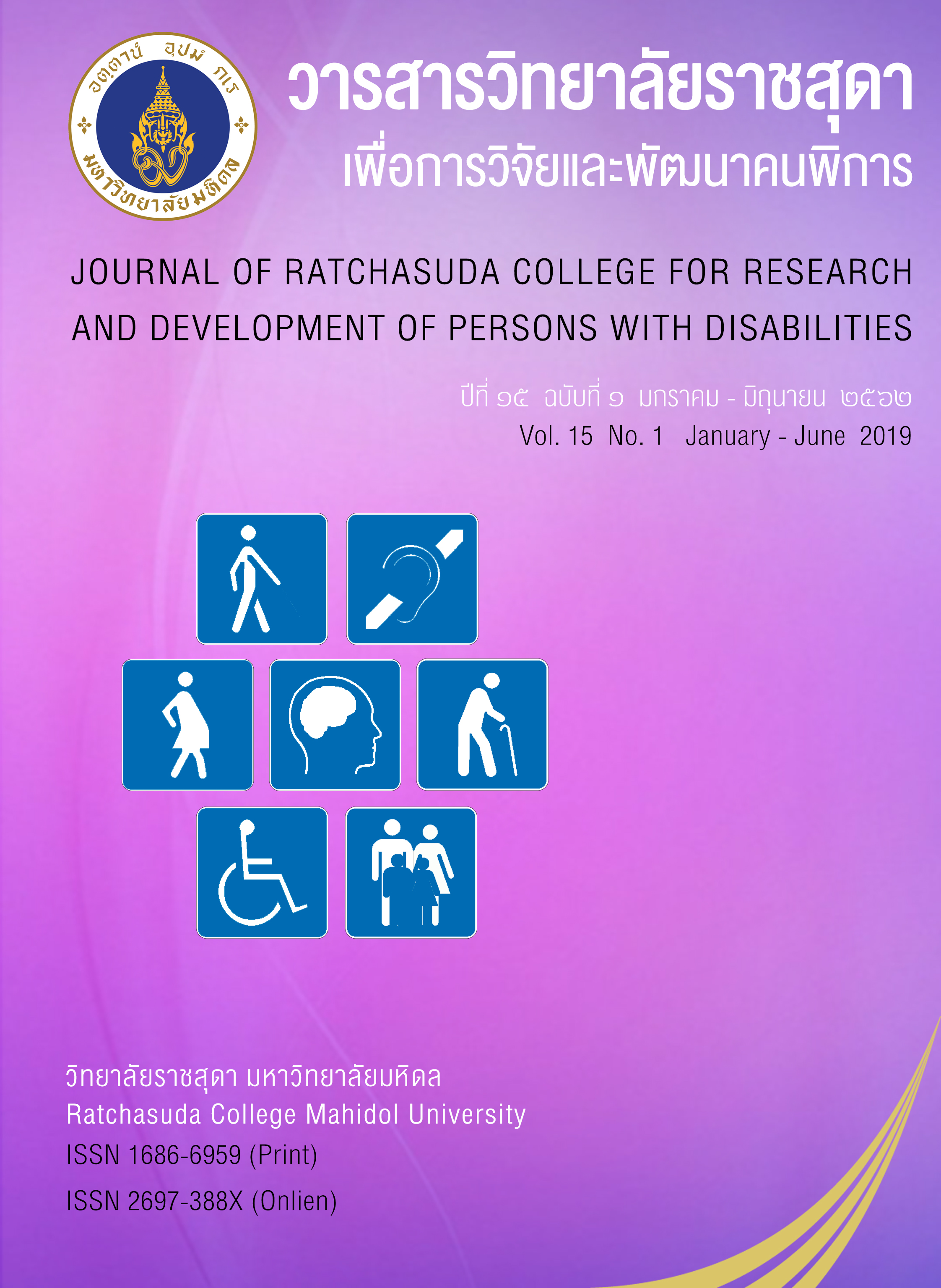MUSIC THERAPY FOR ENHANCING SOCIAL SKILLS IN A NEGLECTED CHILD : A SINGLE CASE - DESIGN
Keywords:
MUSIC THERAPY, GROUP MUSIC THERAPY, SOCIAL SKILLS, NEGLECTED CHILDAbstract
A number of studies have shown effectiveness of music therapy interventions for enhancing social skills of all individuals regardless of age and ability level, including child abuse and neglect. This study employed the A-B-A-B design combined with the qualitative single-case design that aimed to examine the effect of music therapy on social skills of an 8-year-old neglected child. The experiment was organized as two periods including baseline without music (A) and music therapy sessions (B). The Individualized Music Therapy Assessment (IMTAP) and narrative observation form were used as research instruments to assess and collect the social behaviors of the participant. The results of participant's social skills were illustrated using the visual inspection and narrative case study.
The results demonstrated that music therapy enhanced the social skills of the neglected child efficiently. The scores of social skills in baseline sessions (A1) were lower than the scores of music therapy session (B1). After withdrawal interventions, the scores went lower apparently again in the baseline sessions (A2). However, the scores increased again after providing the music interventions in music therapy session (B2).
Downloads
References
Baxter, H. T. (2007). The individualized music therapy assessment profile: IMTAP. Jessica Kin
Child Welfare Information Gateway. (2013). What is Child Abuse and Neglect? Recognizing The
Sign and Symptoms [Fact sheet]. Retrieved from https://www.childwelfare.gov/pubpdfs/
whatiscan.pdf
Darrow, A. A. (2008). Introductiontoapproaches in music therapy. Silver Spring, MD: American Music
Therapy Association.
Davis, W. B., Gfeller, K. E., & Thaut, M. H. (2008). An introduction to music therapy: Theory and
practice. Silver Spring, MD: American Music Therapy Association.
Donald, D. E., & Pinson, J. (2012). Music therapy in principle and practice. USA: Charles Thomas
Publisher.
Katawanich, T. (2546). General Psychology. Bangkok: SE-Education.
Kazdin, A. E. (2011). Single-case research designs: Methods for clinical and applied settings. Oxford
University Press.
King, B. (2004). Music therapy: Another path to learning and communication for children on the
autism spectrum. Future Horizons.
Koonkeaw, R. (2014). Cooperative learning inthe skills group workand studentachievement, music
and movement activities for early childhood stroke. (Research report). Bangkok: Phetchabun
Rajabhat University.
LaGasse, A. B. (2014). Effects of a music therapy group intervention on enhancing social skills in
children with autism. Journal of music therapy, 51(3), 250-275.
Layman, D., Hussey, D., & Laing, S. (2002). Foster care trends in the United States: Ramifications for
music therapists. Music Therapy Perspectives, 20(1), 38-46.
Madsen, C. H. (1998). Teaching/discipline: A positive approach for educational development.
Contemporary Publishing Company of Raleigh.
Pavlicevic, M. (2003). Groups in music:Strategies from musictherapy. USA: Jessica Kingsley Publishers.
Piyasilp, V., & Katetumarn, P. (2002). Child and Adolescent Psychiatry. Bangkok: Beyond Enterprise.
Plordpai, N. (2008). Effects of social skill training on social anxiety among female youths at Young
Girl Development Centre, Chiang Mai Province (Doctoral dissertation, Chiang Mai University).
Plub-rukarn, R., & Suphakunpinyo, C. (2011). Neglected child and Child abuse. in Hansakunachai, T.,
Roongpraiwan, R., Theeranate, C., Fuengfoo, A., Sutchritpongsa, S., & Noipayak, P. (Eds.), Child
developmental and behavior for general practitioner (435-451). Bangkok: Beyond Enterprise.
Poopunsri, V., & Damrongpol, S. (1991). Psychology of Development and Education. Bangkok:
Ramkhamhaeng University.
Rodmueang, S. (2013). Social skills development of early childhood by using creative art activities
(Research report). Chachoengsao: Rajabhat Rajanagarindra University.
Schulberg, C. H. (1981). The music therapy sourcebook. London: Human Sciences press.
Schwartz, E. K. (2012). You and Me Makes-We: A Growing Together Songbook. Center for Early
Childhood Music Therapy.
Staum, M. J. (1993). A music/nonmusic intervention with homeless children. Journal of Music
Therapy, 30(4), 236-262.
Wigram, T., Pederson, I. N., & Bonde, L.O. (2002). A comprehensive guide to music therapy: Theory,
clinical practice, research and training. USA: Jessica Kingsley Publishers.
World Federation of Music Therapy (2014). What is music therapy? Retrieved from http://www.
musictherapyworld.net/WFMT/About_WFMT.html
Yin, R. K. (2009). Case study research: Design and methods (4th ed). United States: Library of
Congress Cataloguing-in-Publication Data.
Zanders, M. L. (2015). Music Therapy Practices and Processes with Foster-Care Youth: Formulating
an Approach to Clinical Work. Music Therapy Perspectives, 33(2), 97-107.
Zitelli, B. J., McIntire, S. C., & Nowalk, A. J. (2012). Zitelli and Davis’ Atlas of Pediatric Physical
Diagnosis. Elsevier Health Sciences
Downloads
Published
How to Cite
Issue
Section
License
Copyright (c) 2019 JOURNAL OF RATCHASUDA COLLEGE FOR RESEARCH AND DEVELOPMENT OF PERSONS WITH DISABILITIES

This work is licensed under a Creative Commons Attribution-NonCommercial-NoDerivatives 4.0 International License.
บทความที่ได้รับการตีพิมพ์เป็นลิขสิทธิ์ของวารสารสถาบันราชสุดาเพื่อการวิจัยและพัฒนาคนพิการ






